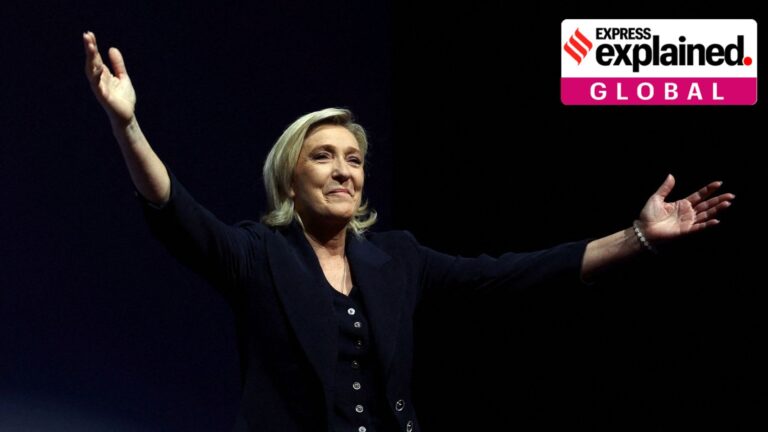In the first round of the election, held on June 30, the far-right National Rally (RN) party won the most votes in its history, with around 33 percent.
In June, French President Emmanuel Macron called for early elections after his party’s defeat by the centre-right Renaissance party in European elections, which Macron hoped would prove that it did not have the broad public support necessary to form a government.
The move was seen as dangerous by political commentators, If there is a real possibility that the RN will come to power,Now that several decades have passed since its establishment, we would like to share its history with you.
With roots in far-right groups and inspired by Mussolini
The RN first emerged as the National Front (FN). Jean-Marine Le Pen, father of former party leader Marine Le Pen, was one of the RN’s founders, along with François Duprat and François Brignault.

Some of its members were from the far-right neo-fascist movement Ordre Nouveau (New Order, ON), which was modelled on the Italian Socialist Movement Party, led by supporters of Italian dictator Benito Mussolini.

The FN attempted to unite several factions of the French far-right. It chose Le Pen, who is seen as a relatively moderate among the far-right groups, as its leader. The party initially took a hard-line stance, opposing Arab immigration from former French colonies in North Africa, as well as European integration and institutions such as the EU.
After remaining on the fringes of the political scene, the party won several local elections in the 1980s and won ten seats in the 1984 European Parliament elections.
In the 1986 Legislative elections, the party won 10% of the vote and 35 seats in the National Assembly. The party’s rise continued into the 1990s, with Le Pen winning over 15% of the vote in the 1995 presidential election. The party positioned itself as an anti-establishment alternative to mainstream French politics.
How Jean-Marie Le Pen shaped that image
Jean-Marie Le Pen has come a long way in French politics, from being considered a moderate to being branded by critics as “the devil of the republic”.
He was elected president of the FN at age 44. He also served in the Algerian War, which was fought between 1954 and 1962 for Algerian independence from French rule.
Le Pen became an MEP in 1956 and was known for her divisive views, often described as racist and anti-Semitic, and was once accused of breaking the law when she described the Holocaust as “part of history”.
In an interview The New York Times “The migration phenomenon is a tsunami,” he said in 2018, at the age of 90, adding that migrants were “becoming more and more numerous and visible, especially in the case of Africans.”
He led the party for nearly four decades and ran for president multiple times, his greatest success coming in 2002 when he won 18% of the vote in the first round of the presidential election, but his advance was halted when protests erupted across the country against him and all parties supported then-President Jacques Chirac.
Marine Le Pen’s transformation
Marine Le Pen is her father’s youngest daughter. A criminal law graduate, she first joined the FN government in 1998. She became the party’s leader in 2011 and ran for the French presidency in 2017 and 2022.
As she rose through the party ranks, she distanced herself from her father’s views and tried to make the party’s positions more acceptable. The party’s Euroscepticism was now expressed as French nationalism, while the party’s traditional principle of “France for the French” was maintained. She maintained the party’s anti-immigration stance, while being vocally opposed to anti-Semitism.
In the 2012 presidential election, she came in third and received over 18% of the vote, the highest percentage in the history of the FN. In 2015, Jean-Marie Le Pen found himself expelled from the party after emphasizing Holocaust denial during a public spat with his daughter.
Marine Le Pen’s efforts paid off, as she capitalized on anti-immigrant and anti-Muslim sentiment following the November 2015 terrorist attacks in Paris. She came second to pro-European Emmanuel Macron in the 2017 presidential election.
In 2018, Le Pen announced she was renaming the FN National Rally (RN), distancing herself from its origins. A year later, the party emerged as a mainstay of French politics, winning the most votes in European Parliament elections.
The most decisive outcome yet will be the 2022 presidential election, in which Marine lost to Macron but still won more than 40% of the vote. She stepped down as party leader later that year.
Le Pen also supported Britain’s exit from the EU in 2016 and aligned herself with Donald Trump when he won the US presidential election.
What is the significance of the outcome of the French election?
If it wins, the RN promises to increase consumer purchasing power, drastically reduce immigration and take a tougher stance on EU rules.
The RN would have an absolute majority if it won 289 of the 577 seats in parliament. A “coexistence” government would then be formed, with party leader Jordan Bardella as prime minister and Macron remaining president, which would involve ongoing negotiations on policies and legislation.
It also comes as right-wing parties in many European countries performed strongly in this year’s EU elections, and France’s right-wing shift could boost support for their common policies of strict border controls, immigration restrictions and uncertainty over green energy funding. European farmers are opposed Taxes on traditional fuels.


